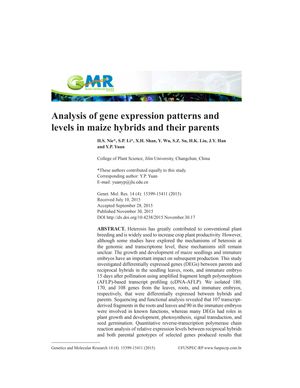Analysis of Gene Expression Patterns and Levels in Maize Hybrids and Their Parents
January 2015
in “
Genetics and Molecular Research
”

TLDR Maize hybrids show better early growth due to complex gene interactions from their parent strains.
The study aimed to understand the molecular basis of heterosis in maize by examining gene expression in hybrids and their parental lines. Researchers identified 458 differentially expressed genes (DEGs) across seedling leaves, roots, and immature embryos using cDNA-AFLP. Functional analysis indicated these genes were involved in key biological processes such as growth, development, and photosynthesis. Quantitative reverse-transcription polymerase chain reaction (qRT-PCR) confirmed non-additive expression patterns for 15 selected genes related to heterosis. The findings suggest that gene-regulatory interactions among parental alleles play a significant role in the superior performance of hybrids during early development stages. The study, supported by the National High Technology Research and Development Program of China and the Science Development Planning of Jilin Province, contributes to the understanding of heterosis but also notes the complexity of its formation, indicating the need for further research.